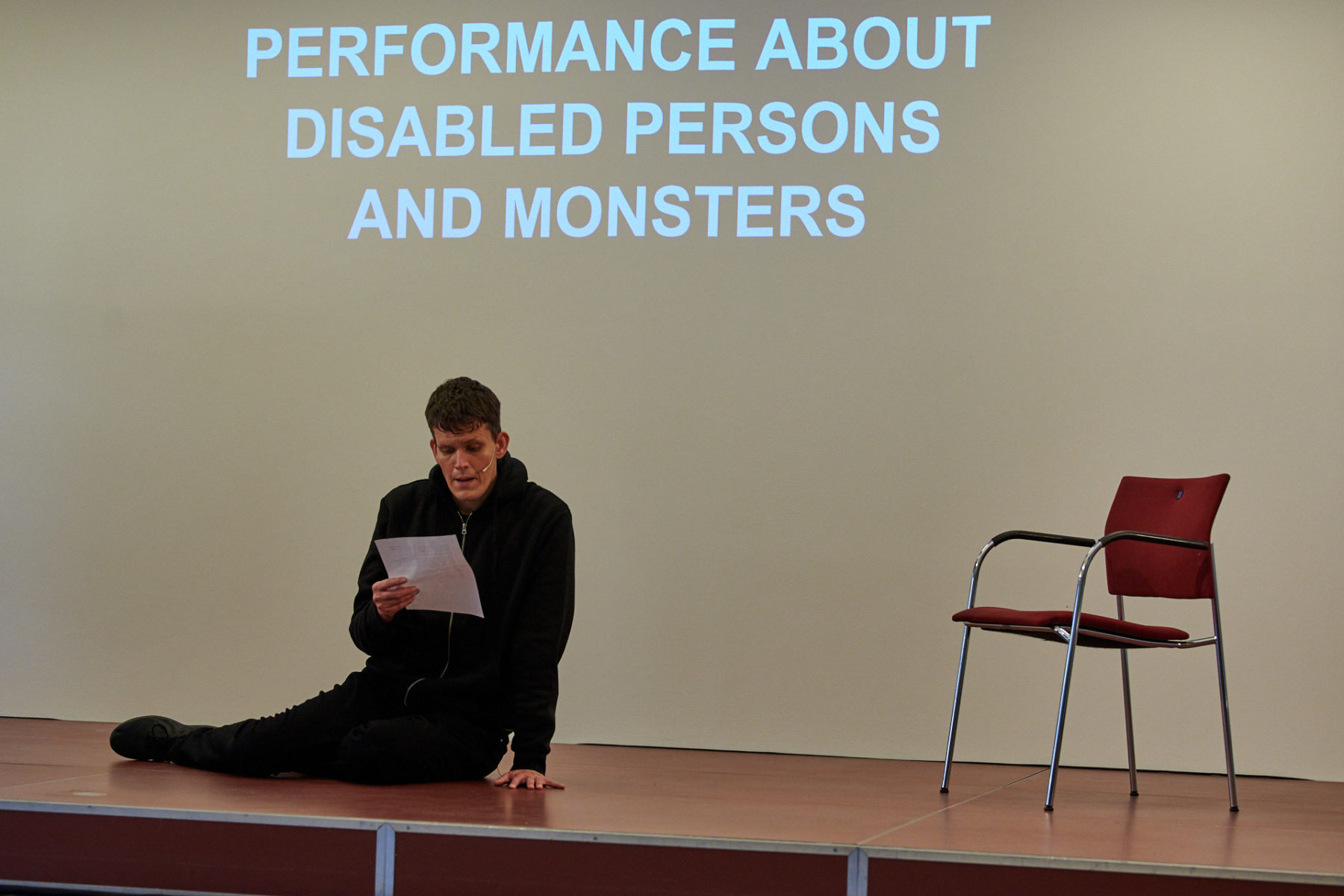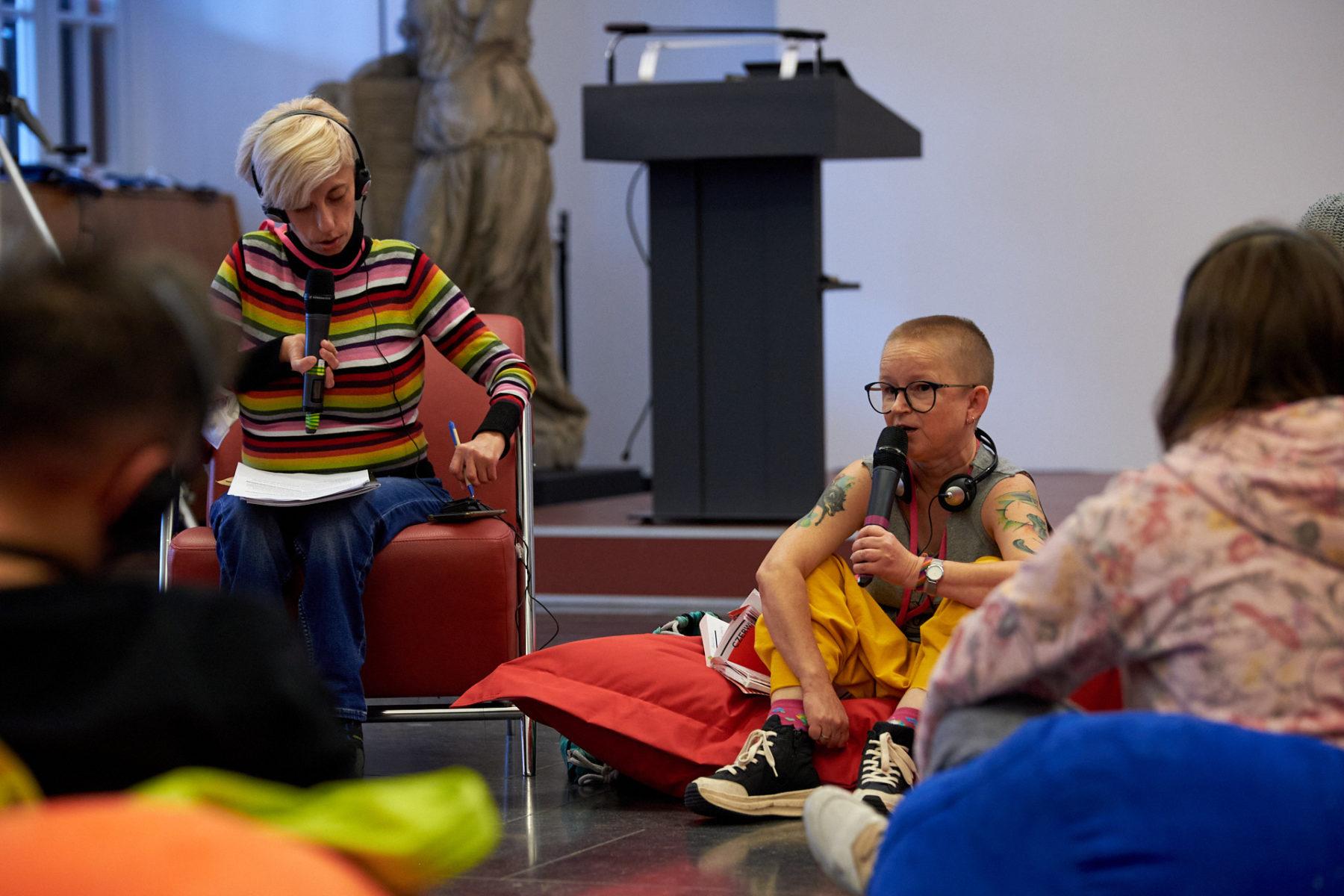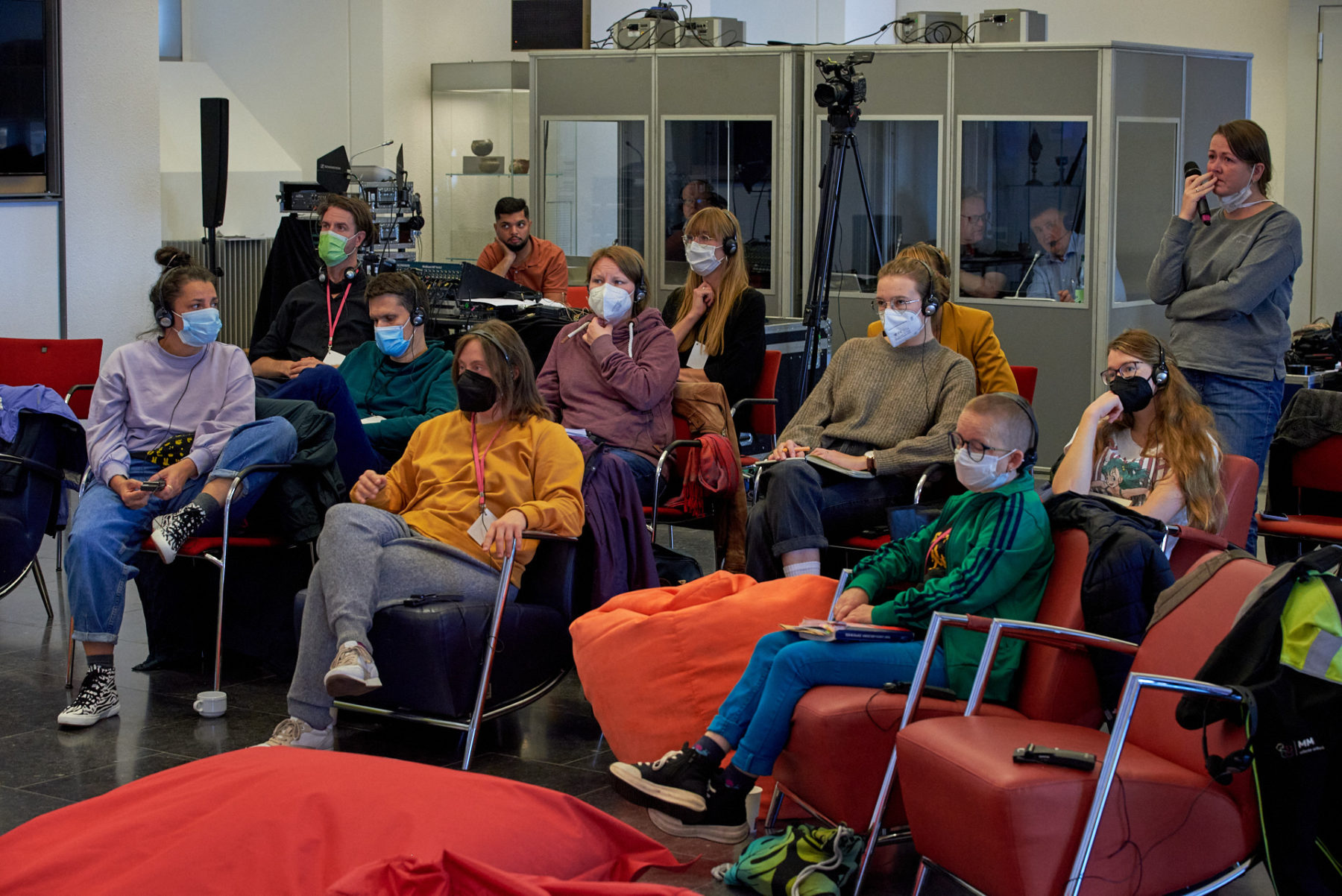The festival Grenzenlos Kultur is traditionally accompanied by a symposium. This year’s three-day symposium took place from Thursday 29th September to Saturday 1st October 2022 at the Landesmuseum in Mainz. Artists from Eastern Europe presented lecture performances, videos, audio art works, lectures, gave presentations and had panel discussions. Every part of the program contributed to the theme of politics of care, solidarity, and presence. Disabled and neurodivergent artists and activists, as well as care workers, and non-disabled artists colleagues and allies, came into contact and shared their thoughts and addresses. The symposium was streamed live online and simultaneously translated into German, English, Polish, German Leichte Sprache and German Sign Language.
Thursday
On Thursday, all participants entered the Landesmuseum to attend the conference and deal with the discussed issues which revolved all around working conditions of disabled artists in Eastern Europe. The room in which the symposium took place was full of cameras, microphones and other technical equipment. Everybody took a seat on chairs, armchairs or beanbags.
After a short welcome by Saša Asentić, curator of the symposium, Maja Kowalczyk, Aleksandra Skotarek and their colleagues from Teatr 21 in Poland presented their video-lecture performance “Body-to-Body with Marilyn” which deals with the reception of disabled bodies in public and society. The performance was shown on a big screen in the front of the room. Both actresses dressed up as Marilyn Monroe were situated in private flats and having a zoom call with each other. The performance dealt with the differences of being man or a woman, disabled or non-disabled and human or non-human. Another contrast: Marilyn. Whereas the Diva lived completely in public, Skotarek and Kowalczyk stayed in their homes. Both deal with isolation and loneliness in consequence of Covid19 but are full of love for their own bodies.

After the polish video performance, Dalibor Šandor from Per.Art in Serbia gave his live lecture performance “Something very special”, which was connected with his performance “We Are Not Monsters”. He argued that disabled people are often seen as monsters by non-disabled people and that non-disabled people are afraid of what they don’t know. For example, of disabled people. In Šandor’s opinion, this is a pity, because there was no reason to be excluded from the non-disabled. He thinks his personality to be interesting and that his disability makes it even more interesting. His performance addressed what it means for disabled people to have to adapt to the way of life of non-disabled just because they want them to. “Treat us equally. We are humans. What are you? Parasites! You force rules on us. You make us monsters.”
After lunch, the program continues with the audio drama “Down, by Law” from Mila Čuljak from Croatia. It was a monodrama about her life from the birth of her son Boris until the creation of the drama. Boris was born with down syndrome and without an anus. Mentioning her exhausting journey with her son, who suffered a lot from intensive care units to doctors an back, she gives an insight into being the mother of a disabled child. Another challenge, she’s facing: Also being a good mother to Boris’ sister. But she showed strength. When a woman in a shopping center called Boris a “poor little downie, poor him.” She retaliates: “Dear Madame, he would be poor if you were his mum. But I am his mum, he’s not poor.”
Last item on the program for the day was a panel discussion about artivism and disability led work, moderated by the Serbian artist Milesa Milinković with Maja Kowalczyk, Aleksandra Skotarek, Justyna Wielgus and Katarzyna Żeglicka from Poland, Kira Shmyreva from Russia living in Germany and Steven Solbrig who is also from Germany. Artivism is a term composed of the words art and activism. The artists discussed their opinion on this term and whether it was artivism every time a disabled person entered a stage to make art. It was lamented that disabled artists often suffer from burnouts because their demands for fair and just working conditions are never heard. In Poland, for example, people with disabilities are not allowed to practice art as a profession. As a disabled artist, one would always be seen as someone with a disability and not as who you are. The question would be whether it would then be possible to make art for art’s sake at all. Teatr 21 was cited as an example of providing opportunities for people with disabilities and empowering them to speak up and express their opinions. Important for them: no manipulation of their texts and always themes chosen by the disabled artists themselves. Everyone agreed that inclusion is necessary, but not always given.
Friday
The day started with a zoom call with Stanislav Turina and Oleksandr Steshenko from atelier normalno in the Ukraine. The two artists gave their presentation “Normality during a great war – notes from Kyiv” giving a short overview of how their actual situation is like since war broke out on 24th February 2022. Their Atelier had to move to an old house and the windows are taped to prevent people from getting injured by the glass splinters in case the windows burst from explosions. An emotional statement of Steshenko left many participants speechless. “Dear Germans […] thanks for your support. […] Please continue to help us. Do not capitulate without giving fight. I beg of you, help us the best you can. I beg of financial, economic, military, agricultural, medical and cultural help. […] My heart is torn to pieces. My heart is in great pain. My heart is bleeding.” The call was ended with good wishes and supporting words from the artists in Mainz. Saša Asentić asked for a list of support opportunities to be sent to him after the online meeting. It contained mainly initiatives in other regions of the Ukraine, where the war is even worse than in Kyiv.

The zoom call was followed by “SHEathed-in. RESPITE. REST. RESISTANCE”, a lecture and body-work lab by Katarzyna Żeglicka from Poland. Everyone participated in a few exercises that Katarzyna instructed. The first one was to concentrate on oneself by closing the eyes and listening to one’s own breathing. The task was to ask oneself: how do I feel at this moment? After that, the participants were asked to form pairs. One should ask the question “What do you love?” for one minute straight and the other one should answer without thinking much. Afterwards, experiences were shared with the group. The last exercise was a movement task where everyone should stand up and move due to a scale from 1 to 10 that measured the intensity of movement. Katarzyna, who works a lot with people who suffered from burnouts, read advices on how to relax to her audience, that people she worked with had written down. At the end, everyone got to take one of these tips, chosen at random.
After a presentation Kira Shmyreva, Zhanna Dryha from the Ukraine, now living in Germany, gave a presentation called “Sunflower Care – politics of evacuation”. She is a neurodivergent artist who left the country with a backpack and could not work after the war broke out. She wondered who she was. A painter who doesn’t paint is no longer a painter. So what could she do instead? She founded an organization that helps disabled people flee Ukraine. In her presentation, she shared stories from her work that gave insight inon how difficult it is for people with disabilities to flee a country, especially when it is at war. The flight is difficult, exhausting and sometimes impossible at first sight. But once they are out, new problems await them. The biggest problem is that refugee camps are not accessible and the conditions are often inhumane.
Saturday
In the morning there were several presentations and a panel discussion under the title “Networking: critical perspectives” by Milesa Milinković from Serbia, Steven Solbrig from Germany and other guests. First, Lilya Oleshko and Kira Shmyreva from Russia presented “Feminist translocalities”, an organization that organizes workshops and conferences as well as exhibitions around the role of cultural workers since the beginning of the war. With a clear positioning against the war. Next, Milesa Milinković spoke about “Seize the film” – a festival focuses on films dealing with disability. It aims to change the way disability is viewed in society, it shows and encourages diversity, promotes and engages potential, deals with and deconstructs stereotypes and prejudices. Steven Solbrig then provided a critical outlook on the german network “Netzwerk nicht-behinderter und behinderter Tanz- und Theaterschaffender”, initiated 2019.

The last item of the symposium was the workshop “Crash Course Leichte Sprache – What is Leichte Sprache and who needs it?” by Anne Leichtfuß from Germany, the founder of simultaneous translation into Leichte Sprache in Germany. What is Leichte Sprache? It’s similar to A2 level, 5 to 8 words per sentence, understandable for everyone, concrete rules. And two reviewers are needed to represent the target audience. Who needs it? People with learning difficulties, dementia or aphasia, illiterates, people who are deaf since birth, people learning German as a foreign language and non-specialists.
All in all, the symposium was a chance for all participants to meet (live) and get in touch with others who are dealing with the same or similar problems or issues in their lives and work. This was the goal Saša Asentić had formulated for these three days, and he successfully achieved it.